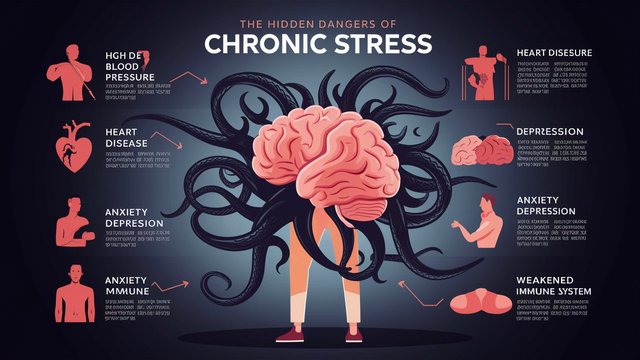The Hidden Dangers of Chronic Stress: Unraveling its Impact on Physical and Mental Health
In today's fast-paced world, stress has become an inevitable part of life for many. While occasional stress can be manageable and even motivating, chronic stress poses a serious threat to both physical and mental well-being. From cardiovascular issues to mental health disorders, the repercussions of prolonged stress are profound and far-reaching.

At its core, stress is the body's natural response to a perceived threat or challenge. However, when stress becomes chronic, the body remains in a constant state of high alert, triggering a cascade of physiological responses that can wreak havoc on various systems.
One of the most immediate effects of chronic stress is its impact on cardiovascular health. The continuous release of stress hormones, such as cortisol and adrenaline, can lead to elevated blood pressure, increased heart rate, and constricted blood vessels. Over time, this strain on the cardiovascular system raises the risk of heart disease, heart attacks, and stroke.
Furthermore, chronic stress takes a toll on the immune system, compromising its ability to fend off infections and illnesses. Research has shown that prolonged stress can suppress immune function, leaving individuals more susceptible to infections, autoimmune disorders, and even certain types of cancer.
The brain is not immune to the detrimental effects of chronic stress either. Persistent stress can impair cognitive function, affecting memory, concentration, and decision-making abilities. Moreover, it has been linked to the development of mood disorders such as depression and anxiety. The constant activation of the body's stress response can also contribute to structural changes in the brain, particularly in areas associated with emotion regulation and stress management.
Beyond its physiological effects, chronic stress can also manifest in various symptoms that impact daily life. These may include headaches, muscle tension, digestive problems, and insomnia. Additionally, stress can exacerbate existing health conditions, worsening symptoms and decreasing overall quality of life.
Addressing chronic stress requires a multifaceted approach that encompasses both lifestyle changes and therapeutic interventions. Adopting stress-reducing practices such as mindfulness meditation, exercise, and adequate sleep can help mitigate the effects of stress on the body and mind. Seeking support from mental health professionals, counselors, or support groups can provide valuable tools for coping with stress and building resilience.
In conclusion, chronic stress is not merely a temporary inconvenience but a serious threat to health and well-being. By understanding its impact on both physical and mental health, individuals can take proactive steps to manage stress effectively and safeguard their long-term health. Prioritizing self-care, seeking support when needed, and making lifestyle changes can empower individuals to navigate life's challenges with resilience and vitality.